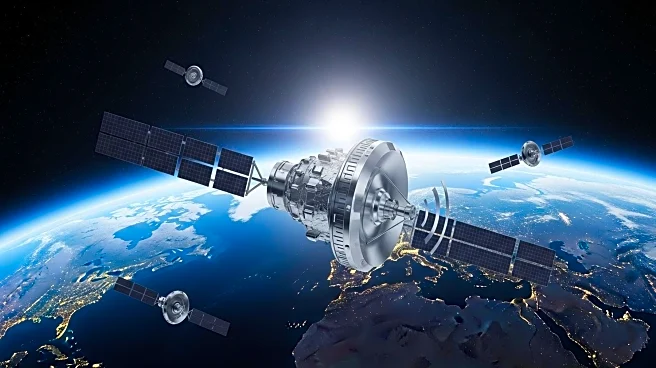What is the story about?
What's Happening?
On September 25, 2025, Amazon and SpaceX conducted significant satellite launches to expand their respective internet services. Amazon launched 27 Project Kuiper satellites using a United Launch Alliance Atlas V rocket, aiming to establish a broadband constellation to rival SpaceX's Starlink. SpaceX, on the same day, executed two Falcon 9 launches, deploying 28 Starlink satellites from Florida and California. These launches are part of a broader effort by both companies to provide global internet coverage, including remote areas. Additionally, NASA and NOAA launched three missions on a SpaceX Falcon 9 rocket to study space weather, marking a significant step in space exploration and safety.
Why It's Important?
The expansion of satellite internet services by Amazon and SpaceX is crucial for global connectivity, particularly in underserved regions. This competition could lead to improved internet access worldwide, impacting industries reliant on digital communication. The launches also highlight the growing role of private companies in space exploration, potentially influencing public policy and international cooperation. The space weather missions by NASA and NOAA are vital for understanding solar activity, which can affect satellite operations and terrestrial technologies, emphasizing the need for robust space weather monitoring systems.
What's Next?
Amazon plans to continue launching satellites to meet its goal of deploying half of its planned constellation by July 2026, in compliance with FCC regulations. SpaceX is expected to maintain its rapid launch pace, further expanding its Starlink network. The success of these missions could lead to increased investment in satellite technology and infrastructure. NASA and NOAA's space weather missions will provide critical data to protect satellites and astronauts from solar storms, with potential advancements in space weather forecasting.
Beyond the Headlines
The intense competition between Amazon and SpaceX in satellite internet services raises concerns about orbital congestion and the environmental impact of increased satellite launches. Regulatory bodies may need to address these issues to ensure sustainable space operations. The collaboration between NASA and private companies like SpaceX reflects a shift towards public-private partnerships in space exploration, which could redefine the future of space missions and international space policy.
















